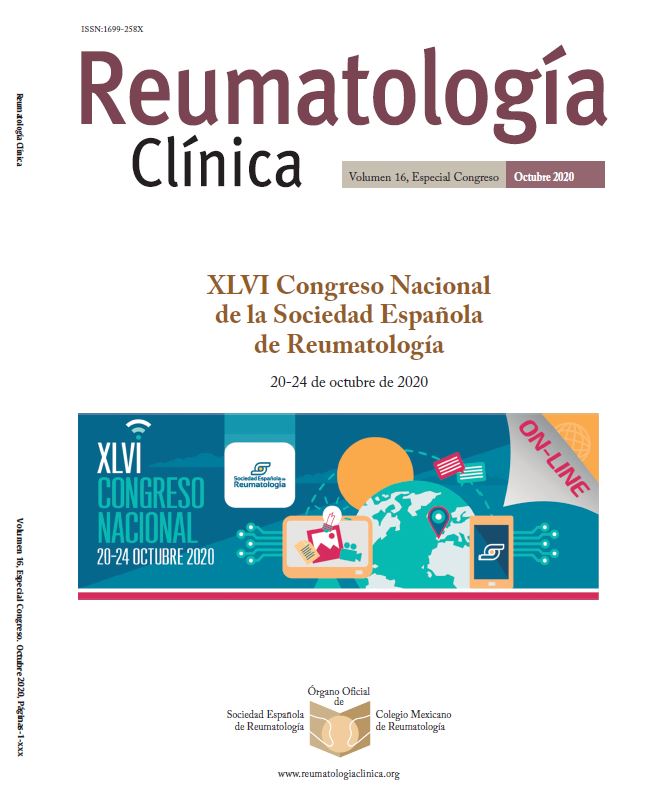P231 - Use of tofacitinib and reasons for discontinuation in clinical practice
Hospital General Universitario Gregorio Marañón. Madrid.
Introduction: Tofacitinib is a JAK inhibitor that inhibits Janus kinase (JAK) 1 and 3 preferentially. Oral tofacitinib 5 mg twice daily is indicated for the treatment of moderate to severe active rheumatoid arthritis (RA) or psoriatic arthritis (PsA) in adult patients with inadequate response or intolerant to one or more conventional disease-modifying antirheumatic drugs (cDMARDs). Since its approval by the European Medicines Agency (EMA), there is limited data about its use in daily practice in Europe.
Objectives: To describe the pattern of use of tofacitinib in routine care, rates and reasons for discontinuation in patients with RA and other inflammatory conditions.
Methods: We identified patients with a prescription for tofacitinib at our academic center from January 2017 to January 2020. Patients were treated according to their rheumatologist evaluation following standards of care. The following variables were retrospectively collected from the electronic medical chart: age, gender, diagnosis, date of treatment initiation, date and reasons for treatment discontinuation, the use of concomitant or previous cDMARDs and of biologics. A comparison between patients continuing and stopping tofacitinib was performed through chi2 or t-test for qualitative and quantitative variables, respectively. Survival analysis was done by Kaplan-Meier method.
Results: Ninety patients receiving tofacitinib were identified, 81 with RA, 6 with PsA, 1 with dermatomyositis, 1 with Sjögren's syndrome and 1 with rheumatoid factor positive juvenile idiopathic arthritis. Table 1 shows the demographic and baseline characteristics. 84% percent patients were women and the mean (SD) age was 58.5 (14.2) years. 51% patients started tofacitinib in monotherapy. When used, methotrexate was the most frequent cDMARD (61.3%); 10% patients used tofacitinib as first line after cDMARD and the majority used it after 1 or 2 previous biologics (46.7%). Survival rates when used as first or second line were 85% at 6 months and 70% at 12 months; when used as third line or further, 76% and 70%, respectively. Factors associated to tofacitinib discontinuation were treatment duration and baseline prednisone dose. In contrast concomitant csDMARD and number of previous biologics were not. Reasons for tofacitinib discontinuation were: lack/loss of efficacy 46.9%, adverse events 50% (including intolerance -22%- herpes zoster -16%-, other infections 12%) and others.
|
Baseline characteristics of the patients |
||||
|
All patients (n = 90. 100%) |
Continue tofacitinib (n = 58; 64%) |
Not continue tofacitinib (n = 32; 35.5%) |
p-value |
|
|
Female (%) |
76 (84.4) |
48 (82.7) |
28 (87.5) |
0.55 |
|
Age (year) - mean (SD) |
58.5 (14.2) |
58 (12.9) |
59.5 (16.5) |
0.63 |
|
Diagnosis |
0.66 |
|||
|
Rheumatoid arthritis |
81 (90) |
52 (89.6) |
29 (90.6) |
|
|
Psoriatic arthritis |
6 (6.7) |
4 (6.8) |
2 (6.2) |
|
|
Other |
3 (3.3) |
2 (3.4) |
1 (3.1) |
|
|
RF/Anti-CCP+ |
65 (72.2) |
40 (68.9) |
25 (78.1) |
|
|
Treatment duration (months) - mean (SD) |
10.6 (6.9) |
11.9 (7.3) |
8.2 (5.5) |
0.02 |
|
Prednisone (mg) - mean (SD) |
1.75 (3.2) |
1.20 (2.5) |
2.73 (4.1) |
0.03 |
|
Monotherapy (%) |
46 (51.1) |
28 (48.2) |
18 (56.2) |
0.244 |
|
Concomitant csDMARDs (%) |
44 (48.8) |
30 (51.7) |
14 (43.7) |
0.62 |
|
Methotrexate (%) |
27 (30) |
17 (29.3) |
10 (31.2) |
|
|
Leflunomide (%) |
10 (11.1) |
8 (13.7) |
2 (6.2) |
|
|
Other (%) |
7 (7.7) |
5 (8.6) |
2 (6.2) |
|
|
Prior biologic treatment |
0.13 |
|||
|
None (%) |
9 (10) |
6 (10.3) |
3 (9.3) |
|
|
1-2 (%) |
42 (46.6) |
28 (48.2) |
14 (43.7) |
|
|
≥ 3 (%) |
39 (43.3) |
24 (41.3) |
15 (46.8) |
|
Conclusions: Tofacitinib in our experience is mostly used in RA patients after biologic failure. Overall survival rate at 12 months was good regardless line of therapy. Adverse event rates were similar to other biologic treatments. Herpes zoster was the most common infectious AE.
References
- Wollenhaupt J, Lee EB, Curtis JR, et al. Safety and efficacy of tofacitinib for up to .5 ¿years in the treatment of rheumatoid arthritis: final results of a global, open-label.






